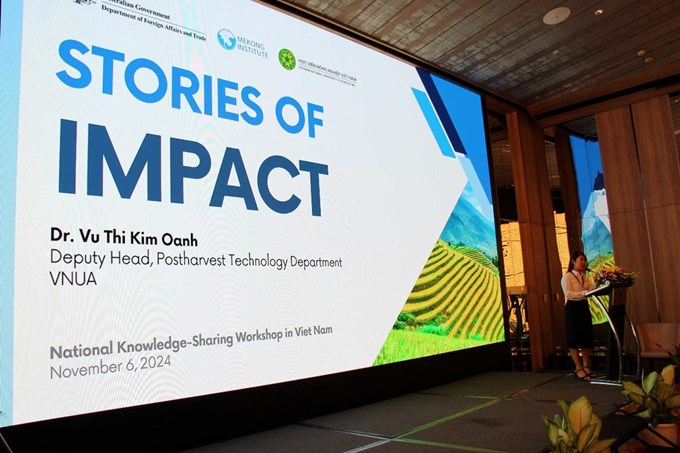Background
Vietnam is renowned for its vegetable production, particularly in regions like Son La, Vinh Phuc Provinces, the major vegetable-growing areas in the north. However, challenges in post-harvest handling and storage persists. Fresh vegetables often spoil quickly, making it difficult to transport them to distant markets or meet export standards. At the same time, inappropriate packaging methods contribute to high post-harvest losses, while reliance on plastic packaging exacerbates environmental pollution.
Recognizing these challenges, Dr. Vu Thi Kim Oanh, Deputy Head of the Postharvest Technology Department, Faculty of Food Science and Technology at Vietnam National University of Agriculture (VNUA), focused her action plan to address these issues. Through her participation in the Regional Training Program on Climate-Smart Agriculture (CSA) Technologies and Innovations in Crop Production and the Study Visit in Australia on Advancing CSA across the Agrifood Value Chain, the program was organized by Mekong Institute (MI) with support from the Australian Government's Department of Foreign Affairs and Trade (DFAT). Dr. Oanh developed simple yet effective solutions to improve post-harvest practices, reduce food loss and increase the export potential of Vietnamese vegetables.
"The training introduced me to advanced post-harvest technologies and practical approaches, such as environmentally friendly packaging and improved preservation methods, that directly address the challenges faced by our vegetable supply chains," Dr. Vu Thi Kim Oanh said.
    |
 |
| Dr. Vu Thi Kim Oanh, Deputy Head of the Department of Post-Harvest Technology, Faculty of Food Technology, VNUA share stories at the ‘’National Knowledge-Sharing Workshop on Advancing Climate-Smart Agriculture in Vietnam’’ |
The Challenges
The vegetable supply chain in Vietnam is hampered by high post-harvest losses occur due to inadequate handling techniques, limited cold storage and poor packaging that reduces product value and farmers’ incomes. In the same manner, extensive use of plastic packaging not only increases environmental pollution but also fails to meet the sustainability demands of international markets.
Compounding these challenges are external factors such as extreme weather, which can disrupt vegetable production, and the limited financial resources and infrastructure of small enterprises, making it difficult for them to invest in improved post-harvest technologies.
CSA Interventions
As a member of the academe, Dr. Oanh leveraged her expertise to address the challenges. She combined curriculum improvement, research development and extension services to promote CSA.
Dr. Oanh conducted tailored training programs for diverse stakeholders, including farmers, SMEs and students. These sessions focused on selecting optimal harvest maturity stages, introducing environmentally friendly packaging techniques and applying advanced preservation methods such as edible coatings and plant extracts. Many farmers and SMEs in Son La, Bac Ninh, Vinh Phuc and Hanoi provinces participated in these workshops, while many farmers in Hanoi received hands-on training in post-harvest treatment techniques.
Recognizing the need to embed CSA practices into long-term learning, Dr. Oanh also revised the content of course: ''Food preservation'', “Food supply chain management and traceability” belong to ‘’Food technology’’ major curricula to incorporate content on CSA technologies. This initiative has already reached thousands students, equipping them with the knowledge to apply innovative post-harvest practices in their future careers. In addition, she published accessible materials and articles on CSA technologies through VNUA’s website, extending the reach of her work to a wider audience.
As part of her extension services, Dr. Oanh organized practical demonstration projects that showcased the application of CSA technologies in local contexts. These included the use of GreenMAP and edible coatings for vegetable preservation, which successfully improved export potential for iceberg and green lolo lettuces to markets like Korea.
Furthermore, Dr. Oanh collaborated with private companies to guide them in adopting these advanced technologies. She partnered with them in conducting trials and coming up with a suitable packaging. She ensured that the solutions developed through research and demonstration projects were effectively scaled, benefiting both farmers and the enterprises involved.
Impact: Reducing Food Loss and Enhancing Environmental Sustainability
Training programs and practical demonstrations led by Dr. Oanh enabled farmers and SMEs to reduce post-harvest losses. Approximately hundreds of tons of vegetables were preserved for export markets, resulting in increased income for farmers and enterprises.
Environmentally friendly packaging and preservation methods reduced reliance on plastic, contributing to climate change mitigation and aligning with global sustainability standards. With improved post-harvest techniques, farmers were able to better utilize their land and expand vegetable production, turning previously fallow land into profitable farming areas.
Students at VNUA also benefitted, gaining knowledge about CSA practices that they could carry into their future careers, ensuring a new generation of agriculturists equipped to address climate challenges.
Impact: Reducing Food Loss and Enhancing Environmental Sustainability
Training programs and practical demonstrations led by Dr. Oanh enabled farmers and SMEs to reduce post-harvest losses. Approximately 50 of tons of vegetables were preserved for export markets, resulting in increased income for farmers and enterprises.
Environmentally friendly packaging and preservation methods reduced reliance on plastic, contributing to climate change mitigation and aligning with global sustainability standards. With improved post-harvest techniques, farmers were able to better utilize their land and expand vegetable production, turning previously fallow land into profitable farming areas.
Students at VNUA also benefitted, gaining knowledge about CSA practices that they could carry into their future careers, ensuring a new generation of agriculturists equipped to address climate challenges.
Please visit the video ''Mekong institute 2024 Accomplishment'' (Source: from Mekong Institute) to see MI's recognition of the successes that Dr. Oanh has achieved in her action plan as an alumnus of MI.
(Source: from Mekong Institute, Khon Kaen, Thailand)
Written by Mekong Institute (MI) and Faculty of Food Science and Technology, VNUA